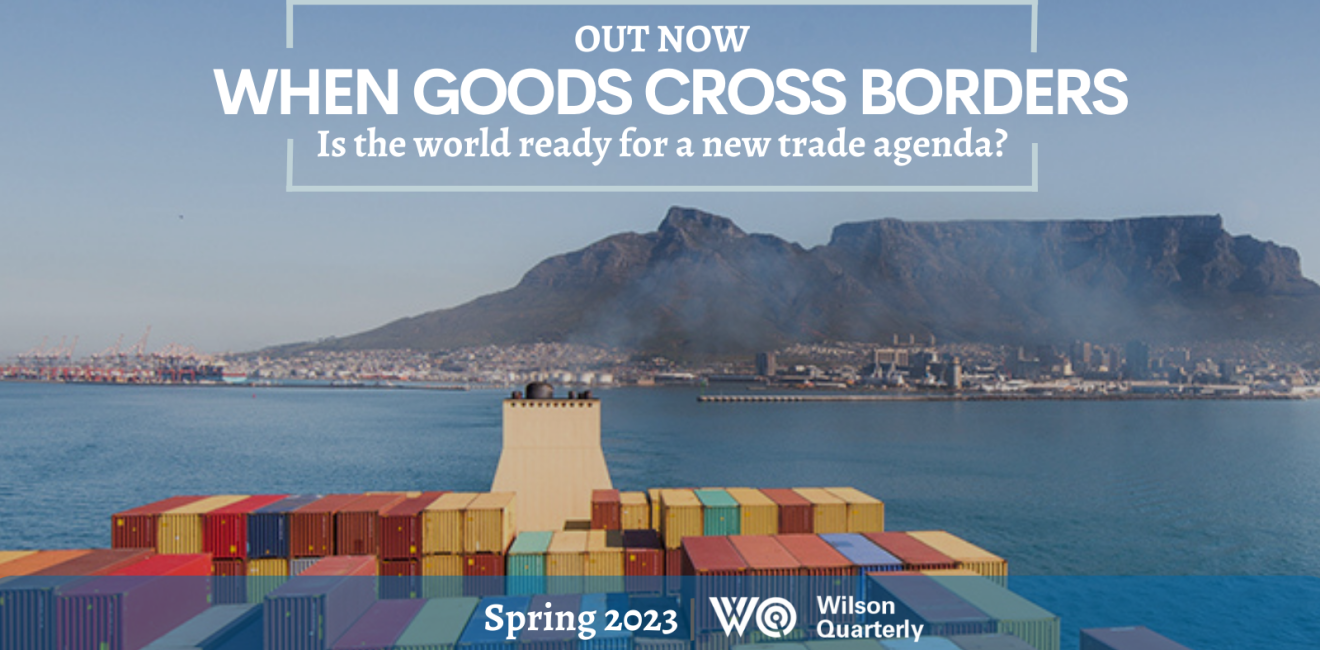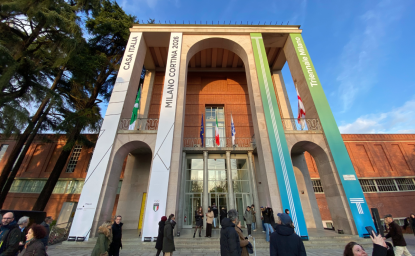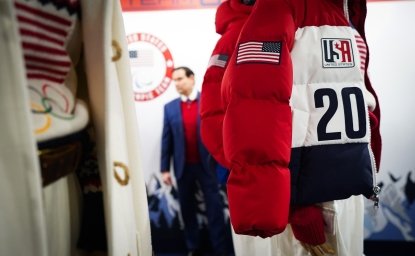
WASHINGTON – Following issues on supply chains and strategic competition, the spring 2023 Wilson Quarterly examines how new trade and other agreements can bind countries together and help them rise in ways that assistance programs cannot—something we have seen, for example, through the Abraham Accords. With authors and examples hailing from all parts of the world, this issue explores the history of trade attitudes, where today’s thinking is situated, and the potential for trade to bring the US and its allies both growth and stability at a crucial economic and geopolitical juncture.
Click Here to See the Award-Winning Website
Contributors include Ecuador President Guillermo Lasso who shares his vision for stronger US trade relations, in a Q&A with journalist Afshin Molavi, UAE’s Trade Minister reflects on the Abraham Accords impact on trade in the Middle East, and Fulbright Fellow Zoe H. Robbin reports on how the Accords have made it possible for an innovative trade of Israeli water for Jordanian solar power using UAE technology. Baroness Catherine Ashton who, in conversation with Robin Quinville, looks at the role trade will play in rebuilding Ukraine, and on the heels of President Biden’s trip to mark the 25th anniversary of the Good Friday Agreement we have a reported piece from Alex Katsomitros about small and medium-sized business owners in Northern Ireland who are navigating Brexit and pinning their hopes on trade for peace and profits. Noted Uruguay Economist Ignacio Munyo makes the case for increased US-Uruguay trade, UNDP Africa Strategy Advisor Joy Kategekwa examines Africa’s trade landscape and offers recommendations for US policymakers, and Zambian reporter Fiske Nyirongo talks with several cross-border women business owners about how trade is helping them chart a new future.
We also have analysis from Michael Kugleman (on how the Abraham Accords have benefitted India), Lucas Myers (about Indonesia’s increasing role in the Indo-Pacific), and Jeffrey Kucick (in a Q&A with WQ editor Stephanie Bowen about inclusive trade and its ability–or not–to heal the wounds of globalization). And to open the issue, Ambassador Mark Green reflects on his time as a teacher in East Africa and later as USAID Administrator to show how trade translates to the very human nature of seeking partnerships to advance the futures of individuals, communities, and nations.
In this issue:
Foreword: When Goods Cross Borders by Ambassador Mark A. Green
Ambassador Green reflects on his days teaching school in rural East Africa and his weekly trips to the open market or soko, and his time as USAID Administrator, to make a larger point about the potential of trade to bring countries together in a way that benefits all participants. He then outlines and provides context for the issue.
Toward a US-Ecuador Trade Agreement by Ecuador President Guillermo Lasso
President Lasso makes the case for expanding USMCA to Ecuador, or at the very least, an enhanced trade partnership.
Trade and the Future of Ukraine: Robin Quinville in conversation with Baroness Catherine Ashton
Baroness Catherine Ashton, former trade commissioner for the European Union, and Robin Quinville, director of the Wilson Center’s Global Europe program discuss the importance of Ukraine linking its future to the EU back in 2013 by signing the Association Agreement, how it helped ensure Ukraine’s institutions were fit for purpose, and in many ways, set the stage for where we are today. Then they discuss how trade will help Ukraine rebuild in ways that help people live, work, and thrive. They discussed the importance of EU, UK and US engagement, and US-EU and US-UK trade relations.
Can Trade Invigorate the Peace Process in Northern Ireland? by Alex Katsomitros
Starting with the story of a family-run cow/milk farm, this piece examines the role of trade in the peace process following the Good Friday Agreement. We learn how Brexit and the Northern Ireland protocol have affected trade patterns, and how trade enhances economic development in the region and thus can bring two communities closer.
Is Globalization Rising Once Again? Afshin Molavi in conversation with His Excellency Thani bin Ahmed Al Zeoudi, PhD
Journalist Afshin Molavi, senior fellow at the Foreign Policy Institute of the Johns Hopkins University School of Advanced International Studies—and former Wilson Center Middle East Program fellow—interviews UAE’s Minister of State for Foreign Trade His Excellency Dr. Thani bin Ahmed Al Zeoudi on the resurgence of economic activity in much of the Middle East in the wake of the Abraham Accords, and new trade relationships they’ve sprung for both the Accord countries and others like Jordan and Egypt.
Trading Water for Sun by Zoe H. Robbin
Israel and the UAE have emerged as giants in the field of climate change, developing technologies in water treatment, renewable energy, and agriculture. But for decades, the conflict between Israel and its Arab neighbors has prevented these technologies from reaching wider populations and uplifting the larger region. The Abraham Accords are now beginning to break these silos, supporting the flow of climate change technology across one of the driest regions on earth. This technology exchange is the backbone of the water-energy deal signed between Israel and Jordan in 2021, and affirmed at COP27. Fulbright Fellow in Jordan Zoe H. Robbin reports.
Abraham Accords Boost India's Prospects in Middle East by Michael Kugelman
The Wilson Center’s senior associate for South Asia writes about how the Abraham Accords allowed New Delhi to advance its foreign policy goal of establishing more “minilateral” arrangements like I2U2, because they enable India to partner with Israel and other Indian friends in the Middle East that now have formal relations with Israel.
Uruguay and the United States by Ignacio Munyo
Uruguayan economist and columnist Ignacio Munyo examines the close historical ties between the US and Uruguay and makes the case for a free trade agreement between the two countries.
Recalibrating US Economic Engagement with Africa by Joy Kategekwa, PhD
Nearly 23 years since the United States established the African Growth and Opportunity Act, the continent it was created for no longer exists. In the last two decades, there have been three major shifts that have worked together to cultivate a new Africa—an Africa that requires a different approach to trade and economic investment. Joy Kategekwa, a globally respected expert in international trade and investment law, policy, and capacity development, takes us through the most important trade developments on the continent and offers pointed recommendations.
Trade is Changing Women’s Lives in Zambia by Fiske Nyirongo
Located in the city center, Ngosa Styles is the go-to clothing store for young women in Zambia's capital, Lusaka. The store was founded by a team of young women—sisters who order their products from around the world. Their boutique-style shop is perhaps the most successful Zambian-owned clothing store in recent history. In this story, the writer interviews Ngosa Styles owners to find out how cross-border trade has changed their lives. And she explores how trade agreements like the African Continental Free Trade Area (AfCFTA) have affected women-owned businesses.
Healing the Wounds of Globalization by Jeffrey Kucik with Stephanie Bowen
In this Q&A, the Wilson Center’s resident expert on inclusive trade sheds light on a relatively new concept in global trade: inclusivity. He tells us what it means, provides important historical context, and analyzes its ability to contribute to a new global trade agenda.


